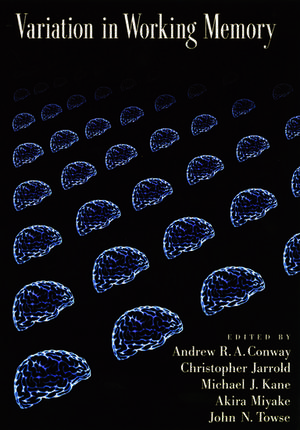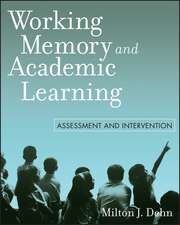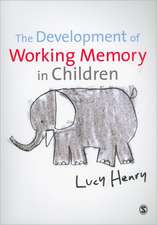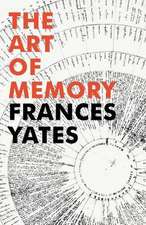Variation in Working Memory
Editat de Andrew Conway, Chris Jarrold, Michael Kane, Akira Miyake, John Towseen Limba Engleză Paperback – 13 mar 2008
Preț: 375.03 lei
Preț vechi: 513.09 lei
-27% Nou
Puncte Express: 563
Preț estimativ în valută:
71.76€ • 75.11$ • 59.73£
71.76€ • 75.11$ • 59.73£
Carte tipărită la comandă
Livrare economică 19-25 martie
Preluare comenzi: 021 569.72.76
Specificații
ISBN-13: 9780195168648
ISBN-10: 019516864X
Pagini: 348
Ilustrații: 5 b&W photographs, 6 colour illustrations and 47 line illustrations
Dimensiuni: 251 x 178 x 18 mm
Greutate: 0.72 kg
Editura: Oxford University Press
Colecția OUP USA
Locul publicării:New York, United States
ISBN-10: 019516864X
Pagini: 348
Ilustrații: 5 b&W photographs, 6 colour illustrations and 47 line illustrations
Dimensiuni: 251 x 178 x 18 mm
Greutate: 0.72 kg
Editura: Oxford University Press
Colecția OUP USA
Locul publicării:New York, United States
Recenzii
Complex working memory span is able to predict performance on a remarkably wide range of cognitive tasks. This book by a group of outstanding young cognitive psychologists asks the question why? It combines experimental and correlational approaches to provide an excellent state-of-the-art overview of current progress on this important topic. I strongly recommend it to anyone interested in cognitive psychology or individual differences.
This book on individual variation in working memory is an excellent collection of chapters by leading investigators, covering key topics in normal adult variation, life span development, and pathology. It appears to be the first collection with this focus on variation in working memory, and it is important for anyone interested in current research on human cognition and brain processes. The book was carefully and insightfully organized and edited by a balanced, very productive team of American and British experts in the field.
Variation in Working Memory is valuable for researchers and advanced students in mental ability differences: historically aware, and theory- and data-rich. There is freshness in the variety of approaches to individual differences in working memory. The editors did a very good job of keeping the contributors focused on a well-chosen set of key questions, giving the book a coherence that is often missing in edited volumes.
A complete understanding of the cognitive and neural mechanisms underlying working memory cannot be achieved until we tackle the questions posed in this volume. The authors present a broad range of empirical data and theoretical viewpoints aimed at accounting for observed individual differences in human working memory. Many different aspects of variation in working memory remain unsolved puzzles, but the ideas put forth in this volume will certainly provide some of the pieces necessary for solving them. If you study working memory, or plan to do so, read this volume from cover to cover.
This is a major achievement, synthesizing experimental and differential work on working memory and related constructs, such as executive control and attention, through a set of insightful chapters by leading researchers in the field. The prominence of research regarding aging, working memory, and executive control reflects important developments in our understanding of cognitive aging and the central role that working memory research has played in its evolution. Likewise, several chapters provide insights on contemporary work on the neuroscience of working memory and executive control. This book is an important contribution to cognitive psychology and related disciplines, and it should be widely read.
This book provides a generally clearly presented outline of the major theoretical and experimental perspectives in contemporary understanding of working memory.
This book on individual variation in working memory is an excellent collection of chapters by leading investigators, covering key topics in normal adult variation, life span development, and pathology. It appears to be the first collection with this focus on variation in working memory, and it is important for anyone interested in current research on human cognition and brain processes. The book was carefully and insightfully organized and edited by a balanced, very productive team of American and British experts in the field.
Variation in Working Memory is valuable for researchers and advanced students in mental ability differences: historically aware, and theory- and data-rich. There is freshness in the variety of approaches to individual differences in working memory. The editors did a very good job of keeping the contributors focused on a well-chosen set of key questions, giving the book a coherence that is often missing in edited volumes.
A complete understanding of the cognitive and neural mechanisms underlying working memory cannot be achieved until we tackle the questions posed in this volume. The authors present a broad range of empirical data and theoretical viewpoints aimed at accounting for observed individual differences in human working memory. Many different aspects of variation in working memory remain unsolved puzzles, but the ideas put forth in this volume will certainly provide some of the pieces necessary for solving them. If you study working memory, or plan to do so, read this volume from cover to cover.
This is a major achievement, synthesizing experimental and differential work on working memory and related constructs, such as executive control and attention, through a set of insightful chapters by leading researchers in the field. The prominence of research regarding aging, working memory, and executive control reflects important developments in our understanding of cognitive aging and the central role that working memory research has played in its evolution. Likewise, several chapters provide insights on contemporary work on the neuroscience of working memory and executive control. This book is an important contribution to cognitive psychology and related disciplines, and it should be widely read.
This book provides a generally clearly presented outline of the major theoretical and experimental perspectives in contemporary understanding of working memory.
Notă biografică
Andrew R. A. Conway is a Lecturer in the Department of Psychology at Princeton University, where he teaches quantitative methods for psychological research. He earned his B.S. in Computer Science and Psychology at Union College and his Ph.D. in Experimental Psychology at the University of South Carolina. He is Consulting Editor for Memory & Cognition and the Journal of Experimental Psychology: Learning, Memory, & Cognition.Christopher Jarrold is a Reader in the Department of Experimental Psychology at University of Bristol. He is a developmental psychologist with a particular interest in working memory functions in typically and atypically developing children. In 2000 he received the British Psychological Society's Neil O'Connor Award for research into developmental disabilities. He is an Associate Editor for Developmental Science and Consulting Editor for the Journal of Intellectual Disability Research.Michael J. Kane is an Associate Professor of Psychology at the University of North Carolina at Greensboro. He earned is B.A. in Psychology from Haverford College and his Ph.D. in Psychology from Duke University. He is Associate Editor for Memory & Cognition, and a Consulting Editor for the Journal of Experimental Psychology: General.Akira Miyake is Associate Professor in the Department of Psychology at the University of Colorado, Boulder. He is a Fellow of both the American Psychological Association and American Psychological Society. He is Associate Editor for the Journal of Experimental Psychology: General. He is co-editor, with Ptiti Shah, of the highly regarded volume, Models of Working Memory, as well as The Handbook of Visuospatial Thinking.John N. Towse is a Senior Lecturer at the University of Lancaster. After studying at Oxford University and Manchester, he worked as a Lecturer/Senior Lecturer at Royal Holloway University of London. He is a former Secretary of the European Society for Cognitive Psychology and is currently Associate Editor for the British Journal of Developmental Psychology.










